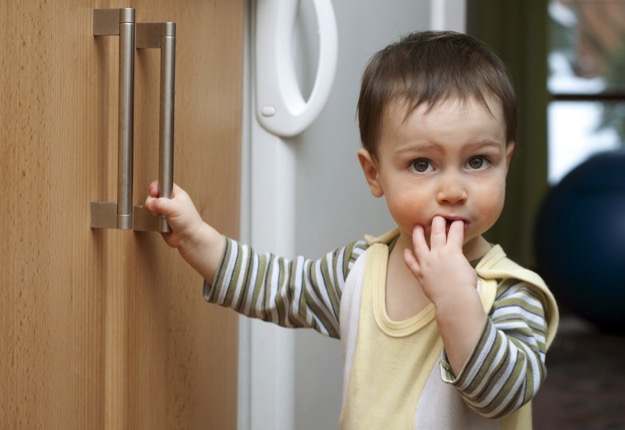Most families see the inside of a kitchen more than most other rooms in the house. A hub for fixing an early breakfast, school lunches, family dinners and more, it can also be one of the most dangerous areas within the home.
Hot temperatures, sharp objects, poisonous cleaning agents and more can pose serious threats to children, unaware of the dangers of their surroundings.
Here are a few simple tips to building a childproof kitchen, and helping to avoid any injuries and accidents:
1) Lock all kitchen cupboards and appliances
Kitchens are often open plan, meaning it’s easy for children to wonder around at will. They’re also usually filled with all kinds of dangerous items, from boiling water and sharp knives, to poisonous detergents and heated ovens.
It’s important to use a variety of locks and latches to prevent access to drawers, cabinets, fridges and more.
2) Store all dangerous items well out of reach
Even with the use of locks and latches, it’s essential that families keep any sharp or dangerous items on high shelves, or out of reach of children.
While cooking it can be easy to leave a drawer or cabinet open, so ensure that children cannot reach any toxic detergents and cleaning items, sharp objects including knives, vegetable peelers, graters and food processor blades. Food needs to be kept out of reach, too – if you cannot install a lock onto your fridge, try to keep all raw meat and any breakable containers as far from the opening as possible.
3) Keep any movable items out of reach
While the hazards of ovens and stoves is commonly understood, we can easily forget that smaller appliances, such as a toaster, hand-held blender and kettle can pose just as many risks for children, who may pull them down.
In use, these items can include boiling water and hot temperatures, but even when they’re not in use, these items can be heavy, and dangerous if they fall. Try to hide as many electrical cords as possible, and push all appliances far away from the edge of your table or counter.
If there is room, many of these can be stored in a cupboard while not in use.
4) Rubbish & recycling must be covered at all times
While rubbish bins don’t pose health risks to adults, children may not understand that rubbish bins are not toys, and that their contents are not to be eaten. Expired food, sharp objects including toothpicks, and other dangerous items need to be kept out of children’s reach – even after they’ve been thrown away. Empty the rubbish bins regularly, keep them covered and out of reach, and ensure that recyclables such as glass bottles are also concealed.
5) Keep all glass and breakables out of reach
It’s not just sharp blades and cleaning chemicals that can be dangerous for children.
Glasses, porcelain plates and more can cause serious accidents if these are accidentally pulled down or smashed.
Use a child safety lock or latch on any cupboards holding glasses, mugs, plates, bowls etc. Push them towards the back of the cupboards, and ensure that the lock is not left unsecured at any point before, during, or after you’ve finished cooking and eating.
6) What to do while I am cooking?
While cooking, it’s ideal to keep your children completely out of the kitchen. The best options are to use a safety gate, high chair or playpen with toys to keep them under your supervision and out of harm’s way. Never hold your child while prepping or cooking food – the chance of an accident is high, and can lead to serious cuts and burns for you both.
It’s particularly important to keep them away from the kitchen while raw food and sharp objects are out during preparation time.
When using the stovetop, keep the handles of all pots and pans facing inwards, to help prevent children from reaching up and pulling hot, heavy objects down.
7) What to do when I’ve finished cooking?
It can often be easier to clean as you go, and we recommend putting away as much raw food, knives and other prep utensils as fast as possible throughout the cooking process.
After all cooking tools have been cleaned and put away, make sure that the cupboards and drawers have been locked, that any cleaning products are put away, and no food – especially raw meat, fish or uncooked pasta – has been left out or fallen on the floor.
Don’t let your children near the oven or stove while they are still cooling down, and if you’re using a dishwasher, make sure that your children can’t get near it until it has been emptied, to prevent accidents including scalding and burns.
Do you have any safety tips for kitchens you can share? Please comment below.




















1:53 pm
7:50 am
10:13 pm
7:43 am
4:13 pm
7:54 pm
11:31 am
-

-
-
mom94125 replied
- 17 Oct 2015 , 6:33 pm
Reply1:14 pm
6:31 pm
10:08 pm
9:34 pm
6:51 pm
2:36 pm
11:44 pm
12:40 pm
2:11 pm
9:47 pm
5:07 pm
9:06 pm
4:37 pm
- 1
- 2
- »
Post a commentTo post a review/comment please join us or login so we can allocate your points.